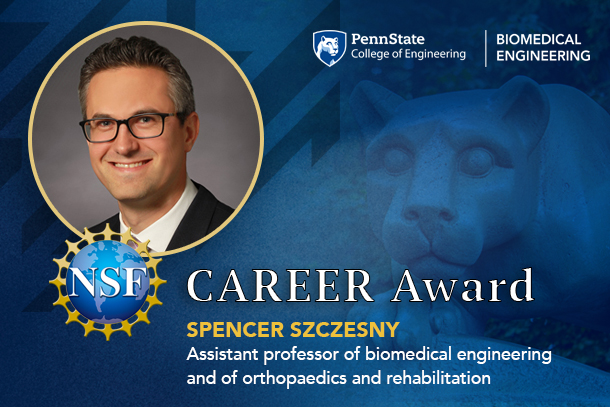
Spencer Szczesny, assistant professor of biomedical engineering and of orthopaedics and rehabilitation at Penn State, earned a five-year, $654,682 NSF CAREER Award. Credit: Penn State.
2022 NSF CAREER Award: Spencer Szczesny
2/28/2022
UNIVERSITY PARK, Pa. — Spencer Szczesny, assistant professor of biomedical engineering and of orthopaedics and rehabilitation at Penn State, earned a five-year, $654,682 NSF CAREER Award for a project titled “Studying tendon cell mechanobiology in the native tissue environment.”
What do you want to understand or solve through this project?
The purpose of this project is to learn why tendons degenerate in response to overuse or fatigue loading. Repetitive loading creates damage to the tendon tissue and activates tendon cells. However, instead of repairing the tissue damage, the cells further weaken the tendon by degrading the tissue structure. This leads to further tissue damage, pain and tendon rupture. In this project, we will investigate how tissue damage causes tendon cells to activate a degenerative response. Importantly, we will study the response of tendon cells to mechanical loading while still in intact tendons, which preserves important interactions between cells and their environment. This requires the development of novel experimental techniques to observe cell behavior in dense connective tissue. Therefore, both fundamental scientific knowledge and powerful new experimental techniques will be gained through this project.
How will advances in this area impact society?
The information obtained from our work will identify the mechanisms that drive tendon degeneration. This will help prevent disease and restore tissue structure, which may reduce the likelihood of tendon rupture. Furthermore, our novel experimental techniques may advance our understanding of how cells respond to mechanical loading within a spectrum of different tissues. In the future, this could provide a new pathway for discovering the mechanisms underlying diseases beyond tendon (e.g., fibrosis, aneurysms, low back pain).
Will undergraduate or graduate students contribute to this research? How?
Graduate and undergraduate students will contribute to this research. Graduate students will perform the essential experiments required to validate our novel techniques and understand how tendon cells respond to fatigue damage. Undergraduate students will directly assist with this work and also help refine a low-cost bioreactor that will be used in the lab and in classrooms. Specifically, we will convert their designs into a simple kit that can be translated into K-12 science curriculum to engage students in engineering at an early age. Therefore, students will be directly involved in the work and help inspire future generations of students to carry the work forward in the future. Students interested in participating should email me at ses297@psu.edu for more information.
The NSF CAREER award not only funds a research project, but it also recognizes the potential of the recipient as a researcher, education and leader in their field. How do you hope to fulfill that potential?
I hope to fulfill the potential of being a researcher and an educator by directly incorporating scientific research with experiential learning at the undergraduate, graduate and high school levels. I will also use this work to establish myself as a leader in the field of tendon research by discovering the fundamental mechanisms driving tendon degeneration. Furthermore, our novel experimental techniques will enable new opportunities for studying cell behavior in their native environment within a range of different tissues.



